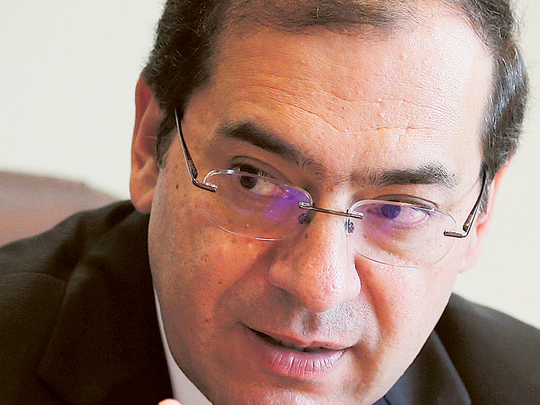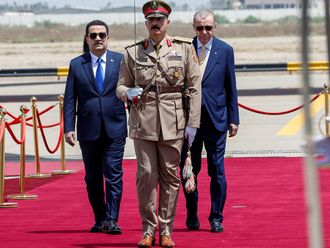
Dubai: Egyptian Petroleum Minister Tarek Al Molla attended on Monday an oil conference in Abu Dhabi where he said he was not going to Iran, appearing to contradict a report on Sunday that he was on his way to Tehran to strike new oil deals.
Reuters quoted sources close to his delegation on Sunday as saying he was on his way to Tehran. One source was reported as saying he was due to meet several senior Iranian officials to discuss the possibility of securing oil supplies from Tehran.
On Monday, Al Molla told Reuters: “No Iran visit. I am attending the conference.”
His statement came as Riyadh informed Egypt that shipments of oil products expected under a $23 billion (Dh84.48 billion) aid deal would be halted indefinitely, suggesting a deepening rift between the Arab world’s richest country and its most populous.
Saudi Arabia agreed to provide Egypt with 700,000 tonnes of refined oil products per month for five years in April, during a visit by Saudi King Salman Bin Abdul Aziz Al Saud.
The cargoes stopped arriving at the start of October, as festering political tensions burst into the open, but Egyptian officials said the contract remained valid and had appeared to hold out hope that oil would start flowing again soon.
Saudi Arabia’s state oil firm Aramco has not commented on the halt. But Al Molla confirmed it had halted the shipments indefinitely.
An oil ministry official told Reuters: “They did not give us a reason. They only informed the authority about halting shipments of petroleum products until further notice.”
Iran’s Mehr news agency on Monday quoted an unnamed Iranian official as saying at Al Molla will visit Tehran later in the day for talks with his Iranian counterpart.
“Egyptian oil Minister Tarek Al Molla will meet Iranians Oil Minister Bijan Zanganeh this afternoon Both sides will discuss expansion of crude oil trade,” the unnamed Iranian official said in an interview with the semi-official Mehr news agency.
Egypt and Iran’s diplomatic relations have been strained since the 1970s. An Egyptian official visiting Iran would cement a break in its alliance with Saudi Arabia and mark a seismic shift in the regional political order.
The oil ministry spokesman declined to confirm or deny whether Molla was scheduled to visit Iran, saying he had gone to Abu Dhabi to attend a conference. Foreign Ministry spokesman Ahmad Abu Zaid said he had no information on the visit.
Speaking to reporters in Abu Dhabi, Al Molla said he was not going to Iran.
But two security sources and a source in Molla’s delegation said the minister had been scheduled to go though the low-key visit was now likely to be delayed after the news became public.
Gulf Arab countries, led by Saudi Arabia, have pumped billions of dollars into Egypt’s flagging economy since mid-2013, when general-turned-president Abdul Fattah Al Sissi seized power, ending a year of divisive Muslim Brotherhood rule.
But with the Brotherhood threat diminished, some states have grown disillusioned at what they consider Al Sissi’s inability to reform an economy that has become a black hole for aid, and his reluctance to back them on the regional stage.
Egypt has been reluctant to provide military backing for Riyadh’s war against the Iranian-backed Al Houthi group in Yemen.
In Syria, where Saudi Arabia is a leading backer of rebels fighting against Iranian-backed Bashar Al Assad, Al Sissi has supported Russia’s decision to bomb in support of the president.
A deal to hand over two Red Sea islands to Saudi Arabia, made at the same time as the oil aid agreement, has faced legal challenges and is now bogged down in an Egyptian court.











